"Black Islam": US social-racial split aggravated by religious
The events in Ferguson demonstrated the immediate readiness of the African-American population to revolt. It is obvious that the social and racial problems in the United States have gone so far that it is safe to say about the possibility of armed conflicts on racial and social grounds in this state, posing as an example of democracy and tolerance. It is no secret that the African-American population in the United States is increasing in number from year to year, but its social problems are practically not solved. Unemployment, poverty, single-parent families, criminality, drug addiction, AIDS - this is not a complete list of the social negative in which most of the African American population lives. The descendants of former slaves did not succeed in raising the social level for the most part, at least to an approximate correspondence to the white population. As a result, it is black Americans who make up the majority of street criminals, drug dealers, and residents of American prisons.
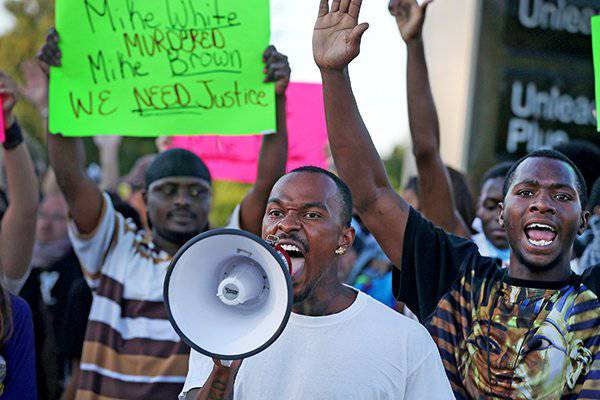
The average African American family lives twenty times worse than the Anglo-Saxon family. Young African Americans are several times more unemployed than their peers from white families.
Against the background of the dismal social situation of the African-American population, the United States faces an equally serious problem - the spread of the Islamic religion among the black citizens of the country. Islam for African Americans becomes an alternative to the official Protestant trends. Accepting Islam, the African-American seems to be challenging the existing political and social system, emphasizing its “anti-American identity”, its reluctance to associate it with the American world and way of life, for many black US residents still perceived as a world of exploiters.
The desire for isolation from the whites of the US population increased among African Americans as the formation of a special African American identity, the emergence of its own intelligentsia, perplexed by the search for the foundations for an “African Renaissance” in the New World. A significant role in emphasizing their “otherness” for African Americans was played by religious isolation. The African-American population began to perceive Christianity, in particular, the Protestant denominations that are common among the Anglo-Saxon part of the population of the States, as the “white religion”.
Beginning in the first quarter of the twentieth century, “alternative” African-American and Afro-Caribbean communities have emerged in the United States of America and on the islands of the Caribbean, refusing to practice Christianity and passing on to other religious practices. In Jamaica, as is known, Rastafarianism emerged around this period — the Afro-centrist social and religious movement, which subsequently gave an impetus to the emergence of the well-known subculture “Rastamanov”. His appearance is associated with the name of Marcus Mosiah Garvey - a native of Jamaica, who was one of the first Afro-Caribbean public figures who spoke about his own identity among African Americans and Afro-Caribbean people, about the need for separate existence of the white and black races, which he sought to achieve by returning the descendants of slaves brought from Africa back - to the African continent. If Rastafarianism was established and widely spread on the islands of the West Indies, then Islam began to spread in the United States of America in the 1930s.
Nation of Islam
In the Americas, the first black Muslims began to appear in the XVI-XVII centuries, since among the African slaves who were brought to the North American coast by slave ships, there were also a limited number of Africans who already professed Islam. As a rule, they came from areas of the Sahel - from the territory of modern Mali, Niger, as well as Guinea and Senegal, captured and sold in the Slave Coast to English, French, Portuguese or Dutch slave traders. However, the presence of Muslims among the black slaves did not lead to the spread of Islam in the African-American environment. First of all, this is due to the fact that the first generation of African slaves was extremely fragmented due to the lack of a single language of communication, and as the English language was mastered, there was a loss of cultural identity, including in relation to religion. Secondly, the American slave owners prevented the spread of Islam among African slaves, purposefully affirming Christianity. The situation changed in the first half of the twentieth century, when interest in Islam appeared among African Americans proper — by that time already free but socially oppressed descendants of slaves.
In 1925, in the town of Newark, New Jersey, a certain Timothy Drew, who adopted the name Ali, founded the religious sect "Moorish temple of science", which included a significant Islamic component in its ideological system. Drew Ali called himself a Muslim and "envoy of the King of Morocco", while being extremely negative attitude towards the white race. At the same time, the worldview of the Moorish temple of science, which ranked among the great prophets not only of Christ and Muhammad, but also of Buddha and Confucius, can hardly be attributed to this remarkable organization among the faithful Muslims. Also, like the text of the “Sacred Karan” (exactly like this - through the letter “A”!) - a brochure in which Drew Ali laid out the basics of his dogma, which was a Christian-Muslim-Rastafarian synthesis.
One of the first “black Muslims” in the United States of America was the silk merchant Wallace Fard, who adopted the name Muhammad. Most likely, he was an African-American, but not a pure black, but a mulatto or Quarteron, since the preserved memories describe this mysterious figure as a person who resembles white. However, it is impossible to say with certainty that Fard Muhammad had anything to do with the Negroid race - with the same success he could be an emigrant from any Arab country, Iran, Turkey, India.
In 1930, Wallace Fard Muhammad founded a small religious community in the city of Detroit, which he called the Nation of Islam. Strictly speaking, the “Nation of Islam” was not an orthodox Muslim community. Her work was directed, first and foremost, to solving the problems of the black population. At the same time, a peculiar cult of Fard's personality arose in the community, which was regarded as the Messiah, the Mahdi. In a fairly short time (from 1930 to 1934), the preaching work Fardi managed to attract more than 25 thousands of African American supporters. Thus, from a small community of extravagant worshipers of Islam, which no one practically encountered in the United States at that time, the Nation of Islam became a dynamically developing religious organization with all the chances for further growth in popularity among the African American population. Perhaps the rapid increase in the number of "Nation of Islam" has caused Wallace Fard to disappear without a trace in 1934. No one heard anything more about this strange man, as a result of which his figure was overgrown with all sorts of myths and acquired a hue extremely romanticized in the eyes of the followers.
However, after the disappearance of the “founding father”, the “Nation of Islam” did not cease to exist. Moreover, it was headed by a new successful leader - Elijah Poole (1897-1975). Thirty-seven-year-old Elijah (Eliya) Poole, a former worker of a car factory in the same Detroit, also took the name Muhammad. He founded the Muslim community in Chicago and became the new recognized leader of African Americans who converted to Islam.
When World War II began, Elijah Muhammad spoke out against the call for African Americans to military service. He argued that it was a war of whites and infidels, and African Americans, especially those who converted to Islam, had nothing to do with it. For the propaganda of the boycott of the draft campaign, Elijah was arrested in 1942 and was imprisoned for four years. They released it in 1946 year, a year after the end of the war.
Unlike other Muslim communities that followed the letter of Islam as an internationalist religion, following the ancient principle of “neither the Hellenes nor the Jews”, the “Nation of Islam” from the first days of its foundation was not so much a religious-Muslim organization as the movement of African-American nationalists. Through the conversion of the African-American population to Islam, community leaders intended to achieve political goals, first of all, to create a separate state of “blacks” in North America. The “black nationalism” preached by the “Nation of Islam” was characterized by a desire to completely separate the African American population from white Americans, and in this respect “black Muslims” also proved to be supporters of racial segregation. Secondly, the “Nation of Islam” attached great importance to the “cultivation” of the African-American population, including the prevention of alcoholism and drug addiction in the Negro environment, and the fight against family violence.
Malcolm "X"
Like many informal religious organizations, the Nation of Islam opened its doors to all African Americans, including those who were in US prisons on charges of various crimes. Appeal to Islam was considered as a way to turn these people away from the criminal path and direct them to the “true path” - that is, to engage in afronationalistic activities in the ranks of the “Nation of Islam”. So in the organization appeared an African-American, whose name was Malcolm Little, but he gained fame as "Malcolm X". In 1948, Malcolm Little was serving a sentence for a series of burglaries in Charlestown Prison. Twenty-three Malcolm, unlike many of his fellow inmates, still managed to get a secondary education, but he went down the criminal path that was usual for African Americans. Drugs, pimping, participation in street fights and, finally, burglary - all of this together has led to the fact that Malcolm received a ten-year term.
Malcolm "X" was destined to become one of the most iconic figures in the African-American nationalist movement 1950's - 1960's. He got to the Nation of Islam thanks to his brother, who advised him to write Elijah Poole. The latter urged Malcolm to engage in crime and abandon the "slave surname invented by the whites." So Malcolm Little became Malcolm "X". Four years later, “Mr. X” was released from prison on parole and closely engaged in organizational activities in the “Nation of Islam”. He founded the “Nation of Islam” temple in Harlem and soon became the most prominent figure among the New York “black Muslims”. By 1960, Malcolm's fame "X" was such that the leader of the Cuban revolution, Fidel Castro, who visited New York, invited him to a personal two-hour conversation.
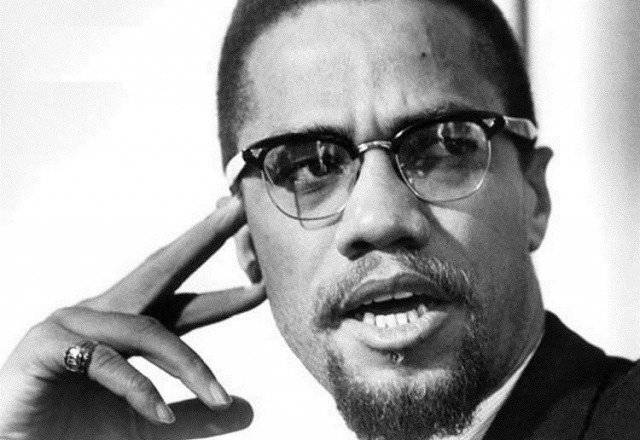
The ideology that Malcolm X preached was based on the same segregationist concept of the “Nation of Islam.” While the majority of African-American human rights activists fought against the segregation of the white and black population of the USA, seeing racism manifesting themselves in black citizens, the Malcolm X, following the “Nation of Islam”, on the contrary called for segregation and the creation of a separate African-American state in part of the United States. Being, like the Jamaican Rastafarians, a supporter of the return of black inhabitants of the New World to "historical homeland ”- that is, to Africa, Malcolm X saw the creation of a sovereign African-American state as the first step towards a cherished dream - repatriation to the African continent. Being a "black racist", Malcolm X was extremely negative about the white population of the United States and the planet as a whole, in every way emphasizing the great importance of the black race as the first people on Earth to who the fairness should belong to the planet.
Gradually, Malcolm "X" gained more and more authority in the "Nation of Islam", pushing aside the level of popularity of its historical leader Elijah Poole. However, disagreements with the latter resulted in Malcolm leaving the organization in 1964. At the same time, he became interested in Sunni Islam and made a hajj to Mecca. In Saudi Arabia, where Malcolm was originally detained, doubting his Islamic religion, after the identity of Malcolm was established, the African-American leader was proclaimed “guest of the state”. The hajj to Mecca contributed to changing Malcolm’s political perceptions of racial differences. Malcolm became a supporter of traditional Islam, moving away from the positions of "black racism" and recognizing Islam as a religion that overcomes racial prejudice. After visiting Saudi Arabia, Malcolm visited a number of African states, where he met a warm welcome everywhere, appeared on the air of the media. Malcolm X’s political influence in the African American community of the United States also grew proportionately, which could not please the leaders of the traditional “Nation of Islam”, first of all - Elijah Poole Muhammad. 21 February 1965, Malcolm X, who preferred to be called El-Haj Malik el-Shabazz, was shot by an activist of the Nation of Islam at a conference of the Organization of African American Unity. Thus, the oldest organization of “black Muslims” dealt with its native, who ideologically deviated from the “right course” and encroached on the authority of the permanent leader - the “prophet” Elijah Muhammad.
In 1975, Elijah Poole Muhammad died - the man who actually created the “Nation of Islam” and who led it for thirty years. His son Wallace Muhammad, who inherited the position of the head of the organization, sympathized with traditional Sunnism and, therefore, gradually lost its position in the African American community. In particular, he departed from the radical “black racism” of his father, arguing that the concepts of “black” and “white” are rather symbolic and it is possible that the black can be “white”, that is, evil, and the European, on the contrary, "Black", that is good. Thus, the fundamental thesis of the classic “Nation of Islam” on the superiority of the Negroid race over the Caucasians was called into question. Accordingly, Wallace Muhammad officially allowed representatives of all races to join his organization, not just Negroids, and then finally confirmed his departure from “black Islam” towards traditional Islam, declaring that his father Elijah Poole was, of course, not a prophet and prophet of God, but was just a religious and public figure. Naturally, such a policy of the new leader of the “Nation of Islam” could not but cause a rejection of that part of the organization, which focused on loyalty to the old traditions, first of all - the ideology of “black racism”. In 1977, one of the leaders of the “Nation of Islam”, Louis Walcott, better known as Louis Farrakhan (Muslim name - Abdul Hakim Farrakhan), split with his supporters from Wallace Muhammad and created his own “Nation of Islam”.
Farrakhan and the revival of the "Nation of Islam"
In the modern United States, Farrakhan's “Nation of Islam” has the greatest influence. It remains the largest organization of Afro-American Muslims, differing from the recent traditional Islamist organizations by a number of ideological and practical nuances. In particular, the members of the “Nation of Islam” remain, first of all, African American nationalists and only then representatives of a religious Muslim organization. Of the five pillars of Islamic dogma, the Nation of Islam admits that it is not necessary to perform namaz (daily five-time prayer), to celebrate Ramadan and Hajj (pilgrimage to Mecca). In fact, only faith in the one god, Allah and Zakat, is obligatory - a regular tax in the community to help the poor and the poor.
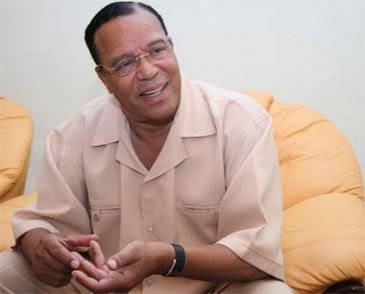 From the point of view of orthodox Islam, the organization’s teachings may seem sectarian and even blasphemous. After all, the founder of the “Nation of Islam”, Wallace Fard Muhammad, is considered one of the incarnations of Allah as one of the incarnations of Allah, and his successor as leader Elijah Poole Muhammad is a prophet. The white race, in accordance with the teachings of the Nation of Islam, emerged as the result of the experiments of the evil scientist Yakub on the creation of "pseudo-people" - the Jews, who initiated the white race, ousted the black one from the leading positions in the world and doomed it to the plight. Christians and Jews worship Jacob as the prophet Jacob, but for the Africans he is the worst enemy behind all their misadventures.
From the point of view of orthodox Islam, the organization’s teachings may seem sectarian and even blasphemous. After all, the founder of the “Nation of Islam”, Wallace Fard Muhammad, is considered one of the incarnations of Allah as one of the incarnations of Allah, and his successor as leader Elijah Poole Muhammad is a prophet. The white race, in accordance with the teachings of the Nation of Islam, emerged as the result of the experiments of the evil scientist Yakub on the creation of "pseudo-people" - the Jews, who initiated the white race, ousted the black one from the leading positions in the world and doomed it to the plight. Christians and Jews worship Jacob as the prophet Jacob, but for the Africans he is the worst enemy behind all their misadventures. Since the Negroid race in the ideological paradigm of the "Nation of Islam" is recognized as the first to give birth to the rest of the races, the great religious teachers are a priori included in the Negroid race, which also raises many questions about the conformity of the organization's doctrine to the canons of Islamic dogma. Finally, the cosmogonic ideas of the “Nation of Islam” also completely go against the traditional Islamic concepts.
Among a certain part of African-American youth, the Nation of Islam is popular, primarily because it paints a reasonably clear alternative to the usual lifestyle of a young man or teenager with black skin on the outskirts of an American city. The activists of the organization go in for sports, refuse alcohol, smoking and drugs, always and in everything they want to help people of the same race with them. Of course, these positive initiatives find sympathy among broad sections of the African-American population. On the other hand, we should not forget that the “Nation of Islam” is considered by the Islamic world as a means of influencing the government of the United States.
Islamic leaders, politicians and public figures prefer to close their eyes to the apparent divergence of the “Nation of Islam” ideology and practice with traditional Islam. The most famous sponsor of the "Nation of Islam" at one time was the leader of the Libyan revolution, Muammar Gaddafi. Most likely, Gaddafi wanted to get a lever of pressure on the United States with the help of African American Muslims, for which he regularly donated substantial funds to help the Nation of Islam. However, Louis Farrakhan himself did not hide his cooperation with the Libyan leader. He owns the famous words that "if God ever destroys America, he will do it with the hands of Muslims." But this did not prevent Farrakhan from supporting Barack Obama at the presidential election - another African-American politician, only of a "system" kind. Here, racial solidarity turned out to be more significant for the “Nation of Islam” than the political and ideological context.
However, the former and real activists of the “Nation of Islam” in the past decade have often become the characters of the American crime chronicles. First of all - in the role of terrorists, destroying representatives of other races and denominations. So, in 2002-2003. Someone Muhammad John Allen, a veteran of the Iraq war, “Desert Storm,” and a participant in the Nation of Islam, shot 18 to passersby and demanded 10 million dollars to stop their terrorist activities, after which they were detained. In 2005, another member of the Nation of Islam, Hassan Akbar, was sentenced to death by throwing grenades to his colleagues while he was in Iraq as part of the American contingent. Although the Nation of Islam as a whole prefers to distance itself from overly radical “black Muslims,” it is from its depths that periodically more radical organizations emerge, which, as a rule, break away from the main structure and continue their independent activities, often far beyond American law.
The radicalization of "black Muslims" and the prospects for the United States
So, back in 1980, the Jamaat ul-Fukra organization, the Jihad Council in North America, broke away from the Nation of Islam. Its founder Mubarak Ali Gilani, having assembled a group of “black Muslims,” created a specific settlement just north of New York called the Islamberg. Later, the settlements of “Jamaat ul-Fukra” appeared in other regions of the United States, especially in Arizona, Colorado, and Georgia. “Jamaat ul-Fukra” is already a purely fundamentalist radical organization, without “distortions” of the “Nation of Islam” towards “black nationalism” and the ideology of its own authorship. Unlike the Nation of Islam, the Jamaat ul-Fukra is in close contact with Pakistan, including, as it should be, with the Pakistani special services. It was in Pakistan that Gilani moved, and it was there that African-Americans recruited by the propagandists of "North American jihadists" were being "tested in". The headquarters of the organization is currently also located in Pakistan.
However, the basics of combat training "jihadists" get in their homeland - in the United States, according to the American press, there are at least thirty-five training camps. The militants who receive training in them are most often recruited among American prison forces — former street criminals and drug addicts, for whom the world of radical politics and religion is a new revelation that can turn all their scanty worldview coordinates. African Americans, who are six times more in jail than whites, are fairly easy to preach to radical propagandists. Since most of them literally have nothing to lose, except for their chains, freeing themselves, they find refuge in training camps.
Someone then goes to war in Afghanistan and Pakistan, in Syria, Iraq, Libya. It is noteworthy that some of the militants immediately go to participate in the fighting on the side of the fundamentalists, while others are being introduced into the units of the American army. Fortunately, the white population of the United States, more prosperous and better educated, is less and less inclined to military service, and the “holes” in the human resources of the American armed forces have to be capped by all sorts of “Harlem” and “Ferguson” residents.
It would seem - in the United States, where there is a tough anti-terrorism legislation, where the special services and the police are engaged in an incessant search for terrorists, to the question of the activities of radical organizations in the country, all the more associated with the Afghan and Pakistani radicals and having their own network of training camps, authorities should be taken more than seriously. However, as practice shows, while the activities of radical "black Muslims" prefer to turn a blind eye. Perhaps they were nurtured in order to use outside the United States in the interests of American world hegemony. By the way, back in the 1980s, the Jamaat ul-Fukra fighters actively participated in the war in Afghanistan on the side of the Mujahideen, who opposed the Soviet forces and the government forces of the PDPA regime (People’s Democratic Party of Afghanistan).
On the other hand, it is not excluded that the “black Muslims” in the multicultural States rely on the “divide and conquer” scheme - in which case they can be used as a counter to radical white nationalists - the conservatives. Moreover, the multicultural doctrine, which is now being affirmed as fundamental for the “American model of democracy”, is fully supported by the existence of a ramified African American movement that can be used to balance in the case of certain “distortions” towards Anglo-Saxon nationalism, socialist ideology, and t .P. Note that most of the African-American leaders in the 1960-2000-s. she died at the hands of her own "brothers in race" from competing organizations, which can speak of the deliberate direction of the actions of the murderers by special services interested in assassinations.
“Black Muslims” currently make up more than 42% of all Muslims living in the United States of America. Another 25% falls on immigrants from India and Pakistan, the rest are represented by Arabs, Iranians, Turks, people from Central Asian states. Thus, it is blacks that represent the largest Muslim community in the United States. Today, more than 20% of the total black population of the United States is Muslim. So, if we are talking about a gradual increase in the number of the African-American population, whose birth rate significantly exceeds the birth rate among white Americans, then we should not forget that in parallel with the increase in the total number of African Americans in the US, the percentage of Muslim population in the country increases. As a rule, young African-American men accept Islam, which makes the communities of “black Muslims” much more passionate compared to Christian-African sects and Protestant churches that are common among the black population of the United States of America. Moreover, in contrast to the crime-oriented "ordinary" African-Americans from the "Negro ghettos", the "black Muslims" have a developed worldview system, have an action plan, have support from the rest of the Islamic world, for which the United States, in many respects, gave rise to the phenomenon religious fundamentalism will always remain “number one adversary.”
Considering that today the United States has in the Islamic world the image of a country that bears primary responsibility for the bloodshed that has been going on for decades in the Middle East, in Afghanistan, on the African continent, in general, the perception of the American state in the eyes of Muslims cannot be very positive. Moreover, among the neophytes from the Afro-American environment, whose religious opposition is exacerbated by traditional social and racial offenses against the existing socio-political system in the United States. That is, it can be argued that in the United States of America as the number of African-American population increases and Islam spreads in the African-American community, the number of people who are negatively related to the very idea of American statehood is growing and that they should be kicked as they are ready. The security services of Saudi Arabia, Pakistan, international Islamic organizations may be behind these people, but the possibility of the existence of associations completely uncontrollable to anyone, in whose depths social and religious protest against the American state machine can not be denied, cannot be denied either.
The influence of religious preachers and public figures arriving in the United States from countries with a long Islamic tradition, such as Pakistan, Afghanistan, Saudi Arabia, Egypt or Morocco, will only strengthen the religious identity of African-American Muslims, further drawing closer of “black Islam” with traditional Islam. First of all, this will cause, as can be expected, the further radicalization of “black Islam”, since it is precisely because of the social status of the black population of the United States that the social and racial overtones will always be extremely strong.
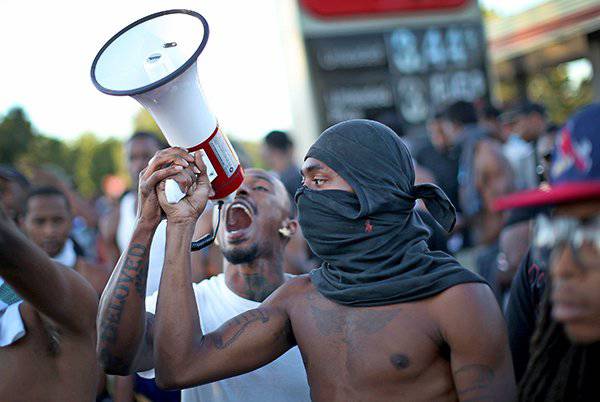
Regular black unrest in American cities makes it possible to doubt the foresight and correctness of the schemes that American leaders and special services can apply to “black Muslims”. Most likely, these organizations are gradually creeping out from under the control of American intelligence services and becoming independent players, the strengthening of which against the background of growing social and racial contradictions in American society is a serious problem. Apparently, the American government is not in a position to solve the existing problem - the conversation with the protesters in Ferguson, which during last year’s protests on a similar occasion, is conducted solely from the standpoint of brute force. But the suppression of the uprisings eliminates only the consequences, but not the causes of social and political discontent of the African American population. Accordingly, such an option is not excluded that sooner or later the world will witness a real social and racial war in the United States of America, and the religious factor in this war, as it should be assumed, will also play an important role.
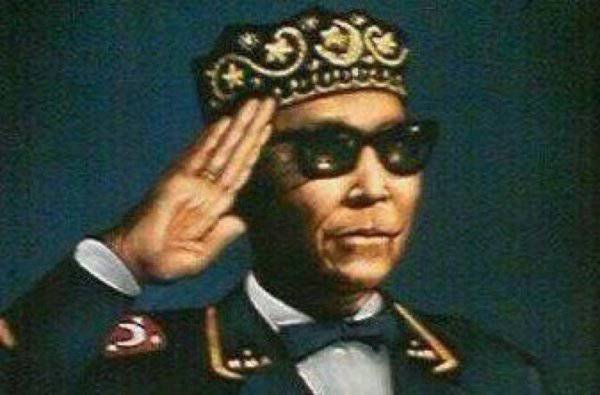
Information